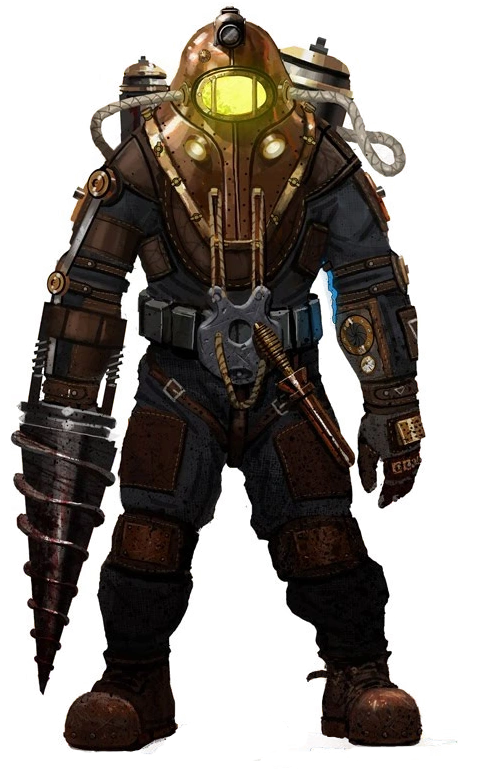In his article “Ruin, Gender, and Digital Games,” Evan Watts examines how post-apocalyptic games, like Bioshock, treat gender. Watts questions whether the destruction of social structures in Rapture “compliment freedom from the gendered power institutions of the culture in which both the game and the player are situated” (254). I would argue that Bioshock offers a complicated presentation of gender.
As Watts points out, the “Little Sisters,” the main female presence in the game, exert freedom by roaming the city. They have the power in the collapsed society of Rapture. Additionally, they travel with “Big Daddies,” which Watts describes as “brandishing large phallic drills, [and] seem[ing] almost a parody of traditional masculinity” (255). Whereas female character usually get made into objects or tools in videogames, here the male characters get treated that way. The men stand as objects that must be destroyed by the player to get to the “Little Sisters.” Bioshock then argues that traditional power structures are societally caused, not natural, as the destruction of society leads to a shift in who holds power.

An image of a “Big Daddy,” with his phallic looking drill
Yet, the player must ultimately confront these female sources of power, and take it from them, either by harvesting or rescuing them. The player, who operates a male player-character, gets encouraged to violently murder them for their own personal gain, as killing them gets the player access to more abilities. Even the word “harvest” tries to downplay the act of violence. The player doesn’t have to murder them though, but the other option present equally questionable ideas, for if the player chooses to “rescue” the girls, it implies the need of a male entity to save them. Though Dr. Tenenbaum presents a female who could also save them, removing the issues, she leaves it up to a man, giving him the power to save them rather than using it herself.

The player can choose to harvest or rescue the “Little Sisters,” but either option reinforces negative gender stereotypes
As Watts posits, the “player can occupy the traditional male role of savior and protector of the female or reject this role, murder the child, and reap a greater quantitative benefit” (256). Either option is problematic, as they either end with a powerless female figure grateful to a male one for taking that power from her, or a dead female figure, killed by a powerful male one. Despite offering seemingly positive notions about gender, Bioshock ultimately reinforces negative stereotypes.
Source:
Watts, Evan. “Ruin, Gender, and Digital Games.” Women’s Studies Quarterly 39, no. 3/4 (2011): 247–65.